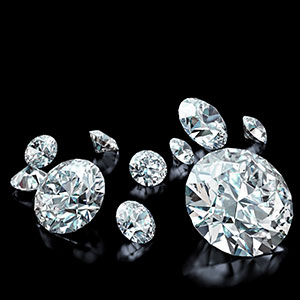
The National Advertising Division (NAD) of BBB National Programs, the ad industry’s self-policing arm, has recommended that Agape Diamonds modify its advertising by clearly and conspicuously disclosing that it is selling lab-grown diamonds and diamond simulants.
The move was made in response to a challenge by the Natural Diamond Council (NDC), which claimed Agape is obscuring the origin of its stones and possibly misleading consumers into thinking they are buying natural gems—a violation of the Federal Trade Commission’s jewelry industry guidelines. Agape received a warning letter from the FTC in 2018.
According to the NAD statement, which is not online but has been obtained by JCK, the Natural Diamond Council submitted several pages from the Agape website and Agape social media posts that use stone or diamond without any qualifiers. For example, one Agape Diamonds product page advertised a “2.50Ct Antique-Style Round Cut Engagement Ring In 14K White Gold.”
“A reasonable consumer [might] incorrectly believe that this simulant is a natural diamond, as there was no clarifying information visible unless the consumer scrolled down,” according to the NDC, as quoted in the NAD decision.
Agape sells lab-grown diamonds, simulants (zircons, cubic zirconia, and moissanite), and some loose natural diamonds. Its main website is diamondslabcreated.com.
The NDC further alleged, according to the NAD, that “Agape utilizes ‘dark patterns’ in its e-commerce shopping experiences to induce purchases of its products before consumers discover that the products contain LGDs or simulants.”
It noted that one Facebook post, which was advertising simulants, featured “text stating ‘$79/Month – Buy Now – Pay Later! Discover designer engagement rings with Agape Diamonds.”
In response to the original complaint, Agape modified advertising across its website and social media. The NAD said that some of Agape’s changes are consistent with the FTC jewelry guides but that other online advertising still does not include clear and conspicuous disclosure.
“For example, a number of [Agape’s] online advertisements depict an image of a jewelry piece with a price quoted, but without any disclosure as to the stone’s origin,” the NAD said in its decision. “Likewise, some thumbnails on the Agape website depict an image of a certain jewelry piece and describe the piece (e.g., “Round Cut Engagement Ring With Filigree Split Shanks”), quote a price, but do not disclose the origin of the stone.”
One point of contention was drop-down menus, which Agape added following the complaint. Agape said they let the consumer choose the type of stone they want—lab-grown diamond or simulant—before they purchase a ring. The NAD said that while drop-down menus do inform consumers, “they are only effective if consumers…receive adequate disclosures before reaching the product page.”
The NAD recommended that Agape always place the term simulated or lab-grown clearly and conspicuously before the word diamond or stone, including in advertising where images would otherwise have no descriptive text.
Agape could not be reached for comment, but told the NAD that it will comply with its recommendations and that it is “committed to accurate and truthful advertising, as recommended by NAD and as codified in the federal regulations and enforced by the FTC.” The company said that “it does not control social media users and search engines which may truncate, edit, or revise its advertisements.”
In recent years, the NAD has refereed disputes between the Natural Diamond Council and Diamond Foundry and between Blue Nile and Brilliant Earth.
Photo credit: Getty
- Subscribe to the JCK News Daily
- Subscribe to the JCK Special Report
- Follow JCK on Instagram: @jckmagazine
- Follow JCK on X: @jckmagazine
- Follow JCK on Facebook: @jckmagazine







